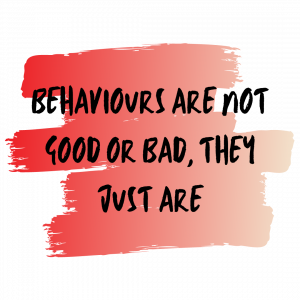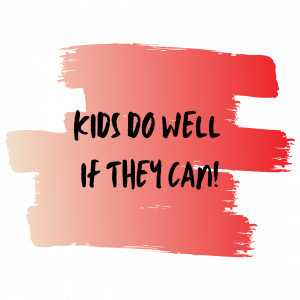For the month of January, we are going to be focusing on the themes of behaviour and time management.
Getting back into a routine with our kids can be tricky, especially following a long winter break. Sometimes our kids’ behaviour can be challenging to handle by ourselves. So, what can we do?
First, we ask, “What is a challenging behaviour?”

A behaviour is simply a response. It can be a response to something external, like a fly landing on our nose, or internal, like feeling hungry. Behaviours are not good or bad, they just are, and they almost always serve a purpose.
A challenging behaviour is one that causes distress. Sometimes, we might view ‘normal’ behaviours as challenging, especially if they’re annoying or embarrassing. But, if the behaviour is not inappropriate, a safety risk, or causing distress to your child, then it is not a challenging behaviour.
Here are some examples:
“My son runs away when he gets overwhelmed. This can be troubling when we are in a crowded mall or near a busy road.”
This is a challenging behaviour because it poses a safety risk to the child.
“My daughter asks me ‘why?’ repeatedly and it puts me over the edge!”
This is a normal behaviour. It does not cause the child distress or risk their safety.
“My son is highly aware of other people’s mistakes and likes to point them out. It can be so embarrassing.”
This behaviour is normal for young kids! It is not inappropriate for their age, does not cause them distress, and is not a safety risk.
“My daughter can be destructive when things do not go her way. She has broken property in my home and public spaces.”
This behaviour is distressing and can be a safety risk. It is challenging.
Second, we ask, “Where do challenging behaviours come from?”

Like other behaviours, challenging behaviours usually serve a purpose. Most challenging behaviours are rooted in fundamental interests like:
Exploration
Human connection
Independence
Justice
Safety
Emotional stability
At Crossroads, we believe that ‘Kids will do well if they can!’ Challenging behaviour comes from a child lacking the skills to meet their needs. When this happens, we can use interventions to bridge that gap.
Kids with behavioural challenges are not challenging every minute of every day. They pose challenges sometimes, in specific situations, where the demand is too great for their skills. The next time your child’s behaviour is challenging, take note of where you are and what is happening around the behaviour. Ask yourself, “What are they communicating to me? What is it that they might need?”
Stay tuned to our Crossroads Blog this month as we discuss behaviour and time management strategies for you and your family. If you feel unequipped to support your child alone, let us help by calling 780-430-7715 today.

